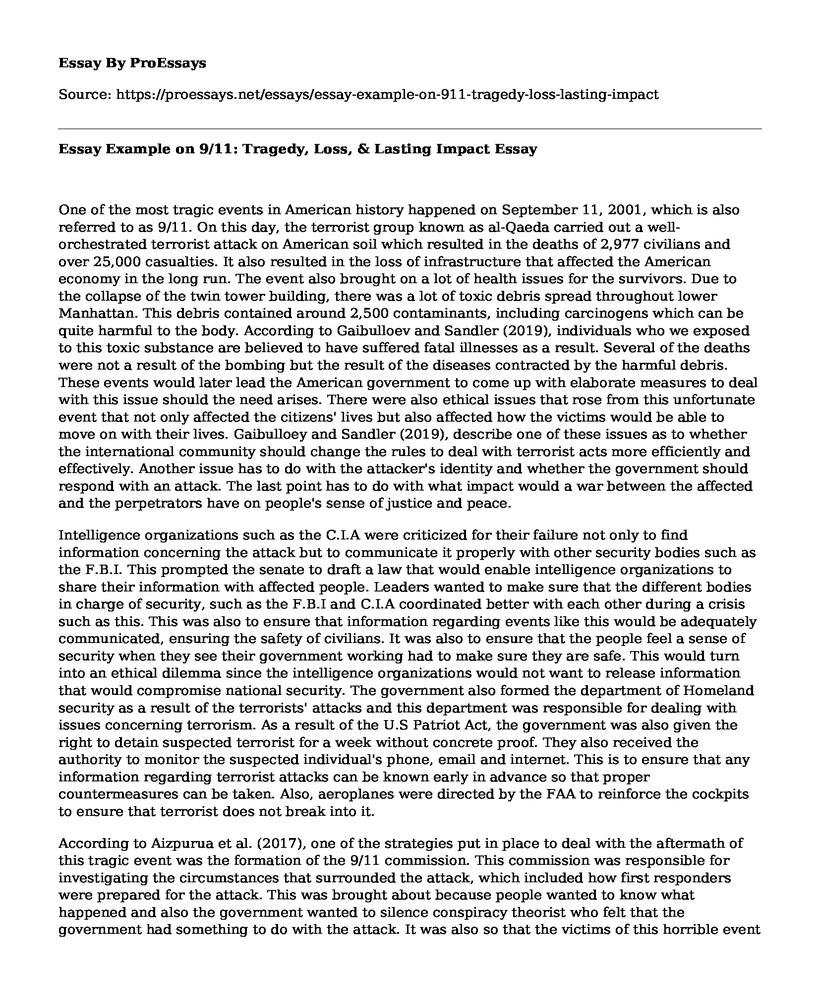One of the most tragic events in American history happened on September 11, 2001, which is also referred to as 9/11. On this day, the terrorist group known as al-Qaeda carried out a well-orchestrated terrorist attack on American soil which resulted in the deaths of 2,977 civilians and over 25,000 casualties. It also resulted in the loss of infrastructure that affected the American economy in the long run. The event also brought on a lot of health issues for the survivors. Due to the collapse of the twin tower building, there was a lot of toxic debris spread throughout lower Manhattan. This debris contained around 2,500 contaminants, including carcinogens which can be quite harmful to the body. According to Gaibulloev and Sandler (2019), individuals who we exposed to this toxic substance are believed to have suffered fatal illnesses as a result. Several of the deaths were not a result of the bombing but the result of the diseases contracted by the harmful debris. These events would later lead the American government to come up with elaborate measures to deal with this issue should the need arises. There were also ethical issues that rose from this unfortunate event that not only affected the citizens' lives but also affected how the victims would be able to move on with their lives. Gaibulloey and Sandler (2019), describe one of these issues as to whether the international community should change the rules to deal with terrorist acts more efficiently and effectively. Another issue has to do with the attacker's identity and whether the government should respond with an attack. The last point has to do with what impact would a war between the affected and the perpetrators have on people's sense of justice and peace.
Intelligence organizations such as the C.I.A were criticized for their failure not only to find information concerning the attack but to communicate it properly with other security bodies such as the F.B.I. This prompted the senate to draft a law that would enable intelligence organizations to share their information with affected people. Leaders wanted to make sure that the different bodies in charge of security, such as the F.B.I and C.I.A coordinated better with each other during a crisis such as this. This was also to ensure that information regarding events like this would be adequately communicated, ensuring the safety of civilians. It was also to ensure that the people feel a sense of security when they see their government working had to make sure they are safe. This would turn into an ethical dilemma since the intelligence organizations would not want to release information that would compromise national security. The government also formed the department of Homeland security as a result of the terrorists' attacks and this department was responsible for dealing with issues concerning terrorism. As a result of the U.S Patriot Act, the government was also given the right to detain suspected terrorist for a week without concrete proof. They also received the authority to monitor the suspected individual's phone, email and internet. This is to ensure that any information regarding terrorist attacks can be known early in advance so that proper countermeasures can be taken. Also, aeroplanes were directed by the FAA to reinforce the cockpits to ensure that terrorist does not break into it.
According to Aizpurua et al. (2017), one of the strategies put in place to deal with the aftermath of this tragic event was the formation of the 9/11 commission. This commission was responsible for investigating the circumstances that surrounded the attack, which included how first responders were prepared for the attack. This was brought about because people wanted to know what happened and also the government wanted to silence conspiracy theorist who felt that the government had something to do with the attack. It was also so that the victims of this horrible event can find closure as they try to move on with their lives. Because the attack happened under the government's watch, they still held some measure of social responsibility. So to uphold the integrity of the government institutions, they had to have complete transparency and accountability to its people. Business owners also had to practice business ethics which meant not trying to profit from this misfortune. This event also affected America's ethical culture because, as a result of the attack, they were more messages and advertisements about patriotism by media stations which made citizens more paranoid about future attacks. The society also became more interested in national security. In conclusion, the 9/11 bombing was a tragic time in American history, and people should make an effort to work with government officials to ensure the decline of terrorism.
References
Aizpurua, E., Singer, A. J., Butler, L. F., Collier, N. L., & Gertz, M. G. (2017). 15 years later: Post 9/11 support for increased security and criminalizing muslims. Journal of Ethnicity in Criminal Justice, 15(4), 372-393
Gaibulloev, K., & Sandler, T. (2019). What we have learned about terrorism since 9/11. Journal of Economic Literature, 57(2), 275-328.
Cite this page
Essay Example on 9/11: Tragedy, Loss, & Lasting Impact. (2023, Apr 18). Retrieved from https://proessays.net/essays/essay-example-on-911-tragedy-loss-lasting-impact
If you are the original author of this essay and no longer wish to have it published on the ProEssays website, please click below to request its removal:
- Why Is Racial Inequality Still an Problem in America?
- How the Work of Bell Hooks Contributed to the Feminist Theory? - Essay Sample
- Critical Essay on "I Have a Dream" Speech by Dr. Martin Luther King Jr
- Research Paper on Drug Epidemic in the United States
- Reaction Paper: Black Men and Public Space
- Position of Women in the Ecclesiastical Office Paper Example
- Alcohol Use in College Students: Cause or Effect of Depression? - Essay Sample







